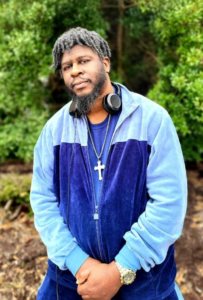One man’s fight for freedom from a system that was meant to help

Emanuel Key standing outside Central State Hospital
“It’s a sad thing that I have been locked up for 10 years, all because of the NGRI process.” Emanuel VaShaun Key, a patient at Central State Hospital (CSH), has been deprived of a life outside a state psychiatric hospital due to the Not Guilty by Reason of Insanity (NGRI) plea.
NGRI, sometimes called the “insanity defense,” is where the Court can find a person not guilty if their mental health was impaired at the time of the crime.
If this sounds like an easy way out, it’s not
When a person is convicted of a crime, they serve a set amount of time in jail or prison and that’s it. When their sentence is over, they’re released. However, there are no sentencing guidelines for NGRI pleas. What would have been a one-year sentence in jail can turn into a lifetime sentence at a hospital.
Many attorneys don’t understand NGRI and believe they’re presenting clients with their best option. Mr. Key commented that his attorney “didn’t give me a formal education on the NGRI process and what it would look like. He only said ‘you can vote [in political elections] with NGRI process,’ but nothing about the rest.” Unfortunately, it’s a very common statement to hear among NGRI patients.
Only after accepting NGRI does the person finally start to learn about all the hoops they must jump through to get released. “I didn’t know I’d have to go through a lot of obstacles and hurdles. It’s overwhelming; when you think you’re done, something always comes up to put you back down,” Mr. Key explained. What he refers to are the many meetings, evaluations, court dates, and other processes that can take years to get through in order to re-enter the community.
Unfair treatment means no end in sight
At any time, throughout this process, a patient can face a setback – sometimes at no fault of their own. If staff doesn’t like a patient, if there’s a misunderstanding, if a patient has one bad day, this could mean starting the whole process all over again. There’s not much a patient can do if they disagree.
In addition, unlike sentencing guidelines where the person gets a set release date, under NGRI, the Court decides if a person is ready to re-enter society. This can make those in charge of the decision (judges, clinicians, etc.) nervous to release patients.
This responsibility can also lead to such a strict oversight of the person that anything might be seen as a problem, making it impossible to ever leave the NGRI cycle. With reputations and licenses at risk, it’s no wonder why patients get stuck in the NGRI system.
Fixing cracks in the system
If a person is receiving unfair treatment, filing a complaint is rarely worth the effort if it’s even an option. External oversight is needed that includes a review of all NGRI cases twice a year and working with the hospitals to address any barriers that stop patients from leaving. External oversight could look at patient’s concerns and complaints, as well as review staff’s use of authority and penalties.
Attorneys need to receive education on NGRI. Attorneys must be expected to explain the NGRI process in detail to clients so that clients have a full understanding before agreeing. Once in the hospital, patients should continue to get education on the process.
Lastly, NGRI cases must be managed by a Mental Health Court or Behavioral Health Dockets, which specializes in mental health cases. This ensures that the NGRI patient is being seen by a court that understands their needs and reduces the stigma attached to mental health.
It shouldn’t be this hard
The Commonwealth needs the NGRI system to get people mental health help and back in the community. However, people with mental health needs end up in state hospitals for far too long. Are people actually receiving help if it takes years, or decades, to be released? Some NGRI patients have been in these institutions for so long, they get nervous just thinking about being discharged. Frustrated, Mr. Key warns, “I would not have gone through the NGRI process if I knew it would be this difficult.”
